The Penn State Extension Master Gardener volunteer program supports the outreach mission of Penn State Extension by utilizing unbiased research-based information to educate the public and our communities on best practices in sustainable horticulture and environmental stewardship.
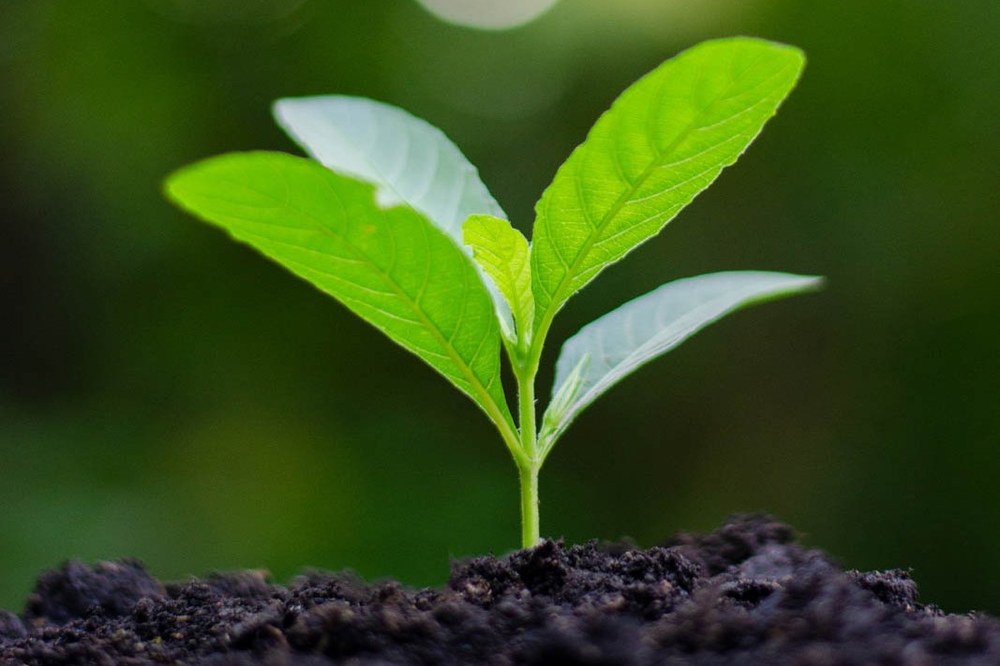
Statewide Highlights
- 3,176 active Penn State Extension Master Gardener volunteers
- 482 newly trained Master Gardeners
- 176,821 volunteer hours reported for a value of $4,715,816
Direct Contacts
Master Gardeners Speak
- 807 single-session virtual or in-person presentations
- 296 radio, TV, or Internet spots
Master Gardeners Write
- 454 news articles published in newspapers, magazines, or external newsletters
Master Gardeners Teach
- 247 educational displays at county and regional events
- 73 virtual or in-person conferences with multiple sessions
- In 83 community garden
- Therapeutic gardening in 20 special needs communities
- In 37 youth camps
- In 281 schools
Master Gardeners Partner
- 470 community, nonprofit, and county organizations
Master Gardeners Donate
470 community, nonprofit, and county organizations
- 26,104 pounds of fresh produce
- 16,718 plants
- 6,019 seed packets
Home Lawn and Garden Newsletter
- 21,212 subscribers
Statewide Facebook Group
- Over 12,000 members
Master Gardeners in the News
- 398 news articles, radio, or TV spots published
about Master Gardener projects
Flight 93
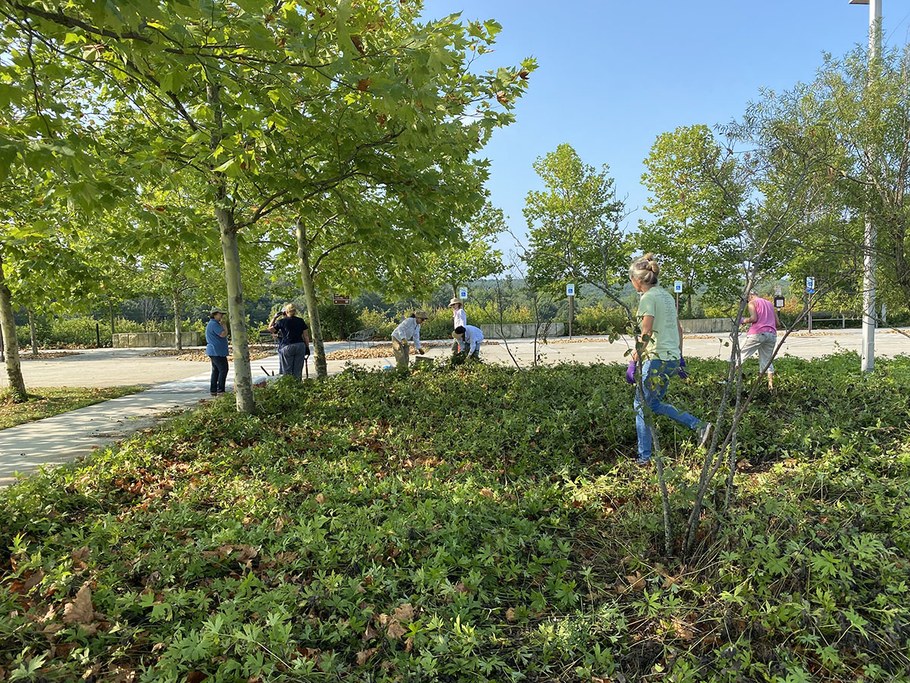
Photo Credit: Val Sesler
In August 2020, the Master Gardener program partnered with the National Park Service at the Flight 93 National Memorial to aid in a service project designed to spruce up the park's gardens ahead of the twentieth remembrance of the terrorist attacks on September 11, 2001. More than 80 Master Gardeners from across the state assembled at the hallowed grounds for two important reasons: first, to provide their expertise and guidance on weed removal, and second-- and most meaningful--to make the park's garden areas more beautiful to pay tribute to the families who would return to Flight 93 to remember their loved ones. In addition, a group of 10 arborists led by Jim Savage, assistant teaching professor of horticulture in Penn State's College of Agricultural Sciences, joined the Master Gardeners to prune and shape the larger trees in the area.
Master Gardeners from as far as the Philadelphia area worked together most of the day weeding and pruning to beautify the space for the families attending the service on September 11. Altogether the Park Service hauled 13 large trailer loads of plant debris away as a result of the Master Gardeners' efforts. During one of the few breaks, Jim Savage provided continuing education to Master Gardeners on tree care. The project at Flight 93 had significant meaning to all of the Master Gardeners in attendance. One Master Gardener noted, "It took me back 20 years, remembering where I was and what I was doing when I found out about the September 11 attacks. I felt it necessary to see the site and help with the cleanup. With observances planned for the twentieth anniversary, volunteering was a small part that I could do."
Seed to Supper
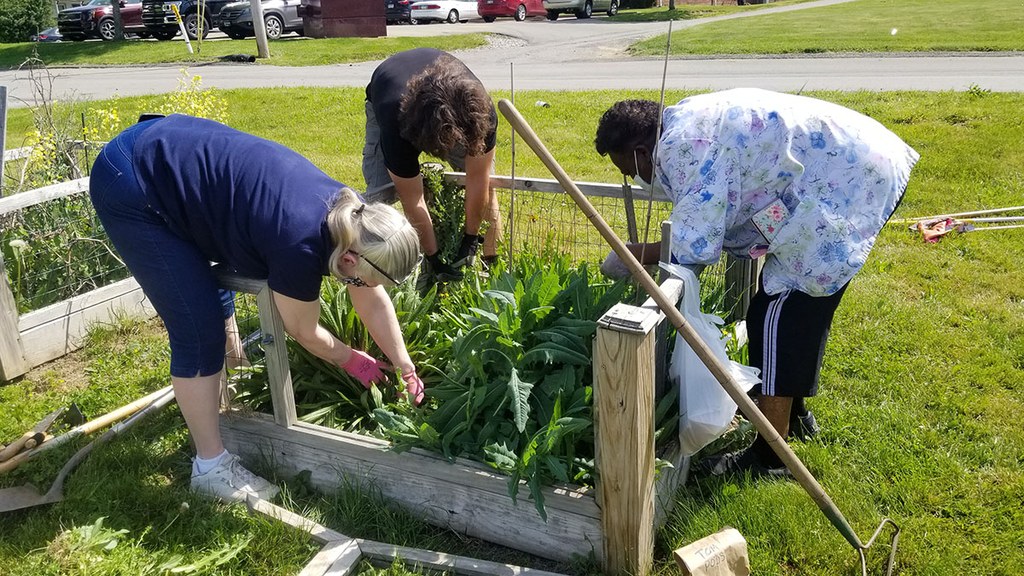
Photo credit: Martha Alexander
Hunger is a growing crisis in every county in Pennsylvania, where 1.4 million people--including almost 400,000 children--struggle with hunger. This translates to one in nine adults and one in seven children who are unsure of how they might get their next meal.
Penn State Extension Master Gardeners offer the Seed to Supper course at no charge to low-income adults and aim to reduce the above mentioned statistics by teaching new gardeners how to successfully grow a portion of their food on a limited budget. Charitable programs are not always able to fully support those struggling with hunger, especially with highly perishable items such as fresh produce. Seed to Supper is offered in collaboration with community-based host agencies to reach those in need.
Ten counties launched the program across the state in 2021. During this pilot year, Master Gardeners experimented with various presentation methods to provide practical, basic gardening education to their communities. The course book, originally developed by the Oregon Food Bank, was revised and updated to reflect the climate of and growing conditions in Pennsylvania. Master Gardeners partnered with Penn State Extension's Food, Families, and Health Team to impart knowledge on nutrition, food literacy, and cooking skills to develop an all-encompassing series of classes to enhance the quality of life for those in need.
"The Seed to Supper program is epic, a real game changer! Everyone learned a lot and had fun."
"One client, who did most of her grocery shopping at the Dollar Store and rarely ate fresh vegetables, now harvests and eats tomatoes from the garden."
"I learned so much information to help me be able to provide food for my family by growing it myself. Not to mention information that I may not have had access to if not for this program."
Seed to Supper course survey
Increased gardening knowledge
- 92 Strongly Agree
- 8 Agree
Learned about available community resources
- 56 Strongly Agree
- 36 Agree
Started to eat more vegetables
- 58 Strongly Agree
- 28 Agree
Tried new varieties of vegetables
- 56 Strongly Agree
- 33 Agree
Garden Hotline
- 401 Garden Hotline volunteers
- 10,896 volunteer hours
- Answered a total of 11,398 questions:
- 11,258 gardening questions
- 140 eXtension questions
"We have called upon Master Gardeners many times-- for advice, help, identification of some plants, some insects, various problems--and every single time they have been most helpful. We used to live in the city and many things in the country have surprised us. Thank you for being so easy to contact, so quick to respond to ALL our questions. We are extremely grateful! Thank you."
Total number of questions asked by category*
(*Data does not include questions answered online through eXtension)
| Question | Comment |
|---|---|
| Disease questions or samples processed at the office | 1,333 |
| Disease samples sent to Penn State Plant Disease Clinic | 123 |
| Garden planning, plant selection, plant propagation | 744 |
| Insect (indoor) questions or samples processed at the office | 310 |
| Insect (indoor) samples sent to Penn State | 111 |
| Insect (outdoor) questions or samples processed at the office | 1,431 |
| Insect (outdoor) samples sent to Penn State | 120 |
| Weed and invasive ID and management | 663 |
| Plant ID | 647 |
| Referrals, upcoming events, Master Gardener program | 484 |
| Site, weather-related, or cultural problem | 472 |
| Soil health (soil testing, composting, mulching) | 952 |
| Spotted lanternfly | 1,273 |
| Plant culture, care, and pruning (includes turfgrass) | 2,086 |
| Wildlife, animals | 352 |
Results from Follow-up survey of Garden Hotline users:
- 77 percent found the information they received useful.
- 95 percent ranked the ability of the Master Gardener to answer the question as "excellent" or "very good."
- 50 percent said they would change or adopt a new gardening practice based on information they received.
- 25 percent said they saved money based on the advice they received.
"[The] info on diseases and pests is fantastic. I learn so much from these webinars. Also, very helpful to learn which plants and varieties are suitable for Pennsylvania gardens. It's great to have the links for future reference. Please continue with this excellent format and very useful information. Thank you and well done!"
"These seminars are awesome. Great presenters. Fantastic knowledge and the ability to communicate that knowledge."
"This was really excellent. I have gardened for decades and don't always expect to learn new things. I really did in this webinar, and can't wait to employ them, as well as use your resources and links."
"I have been watching a lot of webinars since the pandemic shut us down, and this is one of the best. Always pertinent, fact-filled and well-researched."
Garden Hotline Live!
Garden Hotline LIVE! wrapped up another successful year with 1,700 live views and more than 1,000 views of the recording. By collecting and answering questions from gardeners across Pennsylvania, this free public webinar series continues to help participants identify and address problems in their landscapes.
Even in its second year, each webinar has captured an average of 248 live views and 148 views of the recording. They have also had a marked impact on gardeners' confidence. For example, during the June 2021 session, the percentage of participants who rated themselves as "somewhat confident" or "very confident" at managing garden problems without or with fewer pesticides increased from 80 percent before the webinar to 99 percent after the webinar. In addition, the program has become an important tool in delivering timely pest and disease information to the public. Using a "public service announcement" at the beginning of each webinar, Garden Hotline LIVE! has been able to share critical updates about topics such as crape myrtle bark scale, fire blight, and spotted lanternfly.
How much new knowledge did you gain by watching the garden hotline LIVE! webinar?
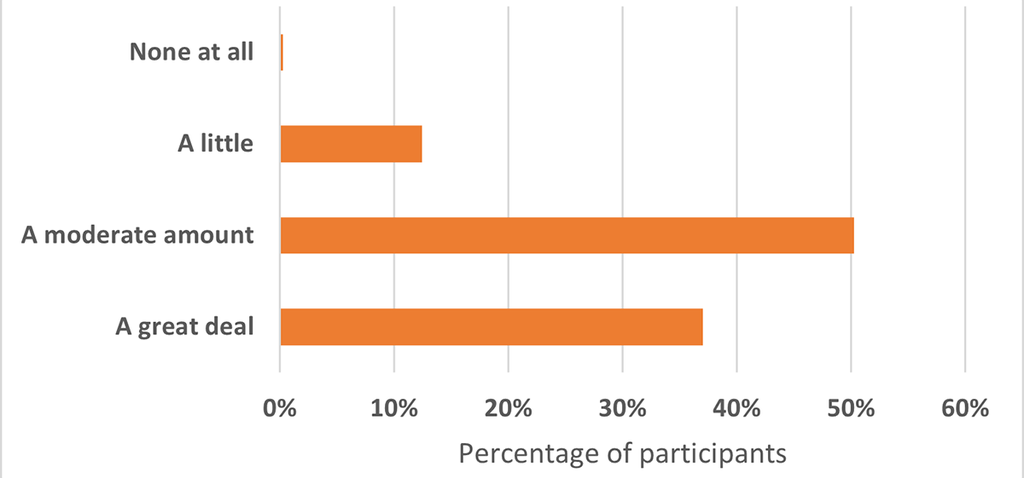
Levels of knowledge gain by percentage of participants from Garden Hotline LIVE! webinars viewed between October 2020 and April 2021.
Will you change or adopt a new gardening practice because of the advice in the webinar?

Percentage of participants who may change or adopt a new gardening practice based on Garden Hotline LIVE! webinars viewed between October 2020 and April 2021.
Virtual Poison Prevention Program
The Master Gardener program continued its 12-year partnership with the Pesticide Education Program, delivering virtually to first-grade students across the Commonwealth in 2021:
- 254 schools in 46 counties
- 12,465 students
The Poison Prevention Program teaches students about pests, integrated pest management, and safe practices, including how to identify the signal words on a label indicating that a product is potentially poisonous. The training teaches the importance of using the Mr. Yuk symbol to alert everyone in the home of dangerous products. A major focus of the lesson is teaching younger siblings, relatives, and friends about using Mr. Yuk to warn of danger and help keep everyone safe.
This vital educational outreach took place from February through April and corresponded with National Poison Prevention Month in March. The collaboration of Master Gardeners, coordinators, and the Master Gardener Youth Growing Gardener Team has opened new opportunities to reach first-graders in a virtual way and will be a viable option for future years.
Ninety-seven percent of survey respondents were extremely satisfied with the virtual lesson, validating future virtual programming options.
"Thank you! We look forward to this program for our first-graders. We are sorry we cannot have you in our building this year, but we are so happy you can still provide this program to our students."
Did you know?
- Poisoning is one of the leading causes of injury-related deaths in the United States.
- In 2019, children under six years of age accounted for 46 percent of all human exposures called into Poison Control centers.
Source: https://www.poison.org/poison-statistics-national

Partnerships
Bee Monitoring Project

Photo credit: Nancy Knauss
Bees are the most important pollinators of flowering plants in natural, agricultural, and urban habitats, and they are critical for their ecological function and long-term sustainability. The decline of bee populations worldwide has called attention to better understanding wild bee pollinators' diversity, distribution, and abundance. A recent study from the López-Uribe lab updated the number of species reported in Pennsylvania to 437, providing the first step to understanding the state's bee diversity. However, the status of wild bee populations in Pennsylvania (whether they are stable, declining, or increasing) is unknown.
The Master Gardener program and the López-Uribe lab collaborated to create an educational opportunity for Master Gardeners to leverage their knowledge and interest in pollinator natural history by training them in bee identification, curation, and sampling protocols. This project offered advanced training to 10 Master Gardeners, chosen to represent specific counties lacking data, through a series of webinars and hands-on field days before project participants independently led field collections. The Bee Monitoring Project Team will use the data collected by participants to gain better knowledge about the diversity and distribution of wild bees in Pennsylvania. In addition, the proposed activities will initiate a state bee monitoring program and be used to collect longitudinal data to identify changes in bee species distribution, diversity, and abundance. Fostering collaborations between Master Gardeners and Penn State scientists will create a team that will synergistically contribute to scientific discovery and solutions to real-life problems of pollinators at a statewide level.
Since August 2021, project participants have collected 1,195 specimens and contributed at least 15 new county species records for Allegheny, Centre, Clearfield, Luzerne, McKean, Mifflin, and Somerset Counties. Project participants have reported gains of knowledge for themselves and opportunities to educate others about the ecological importance of wild bees in Pennsylvania. One Master Gardener participant noted, "Most people I have shared my experiences with about the Bee Monitoring Project are either curious to hear more or dumbfounded because they are not familiar with native bees. They are interested in learning more."
The Bee Monitoring Project was made possible by a Science-to-Practice grant awarded by the Penn State College of Agricultural Sciences. The Science-to-Practice program provides funding to support the formation and development of teams proposing to explore innovative methods, structures, and projects that foster the translation of research into outputs for dissemination and implementation.
Cucurbit Downy Mildew

In spring 2021, Dr. Beth Gugino, professor of vegetable pathology at Penn State, enlisted the help of Master Gardeners across the state to aid in detecting and reporting cucurbit downy mildew, an airborne disease of cucumber, squash, and melon crops. Informed by reports of cucurbit downy mildew nearby, the team learned that a well-timed treatment saves not only a considerable amount of money, but it also saves agricultural workers and the environment from unnecessary exposure to fungicides. Master Gardeners aided the reporting efforts by learning to recognize cucurbit downy mildew through a webinar presented by Dr. Gugino. As a result of this effort, reports of cucurbit downy mildew from home gardeners represented almost half the reports from Pennsylvania in 2021.
Results of Master Gardeners Viewing Cucurbit Downy Mildew Webinar
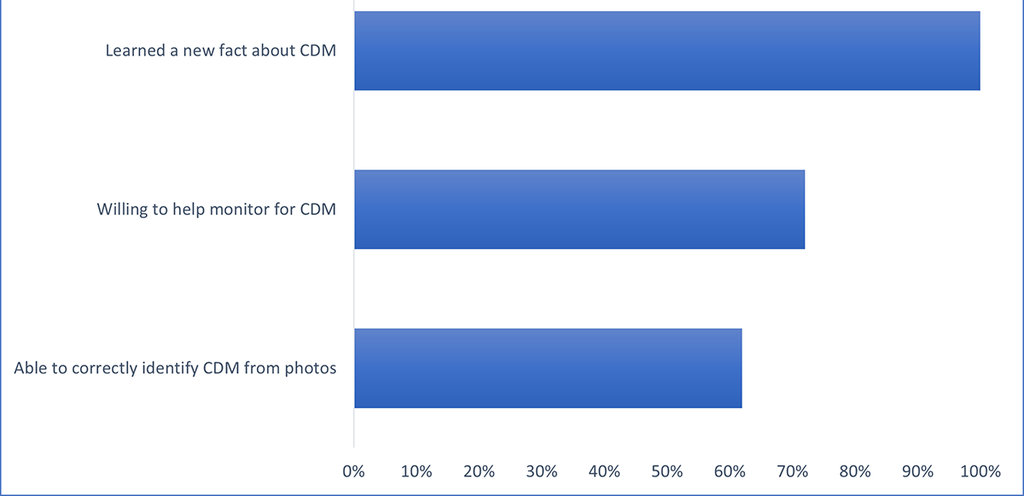
Community Stewardship: Helping Volunteers Lead and Fund Projects

Photo credit: Brad Ti
The Penn State Extension Leadership and CommunityVitality Team and the Master Gardener program saw a need to cultivate volunteers to address environmental issues and climate change in their local communities. An integrated team pilot project was launched with funding from a Science-to- Practice grant. The training uses research-based leadership programming that complements the existing Master Gardener training to empower volunteers to lead and implement local community projects.
The project began by surveying over 1,000 Master Gardeners to identify factors influencing participation in local environmental projects and determining skills needed to become stronger project leaders. The training topics were based on the survey results with instruction led by Leadership and Community Vitality Team faculty and educators. Twenty-six volunteers from six counties enrolled and worked on four different environmental projects.
One of the four projects consisted of cleaning an overgrown garden at a state park and transforming it into a pollinator garden. Another team constructed a rain garden around a pavilion at a new riverfront municipal recreational park that was built from reclamation site. Education on stormwater management, rain barrels, and native plants was provided. A third team provided education on soil health, cover cropping for home gardeners, composting, and other environmentally friendly practices. The fourth team partnered with a community volunteer group to educate residents about the importance of using native plants in their landscapes and distributed plants to low-income homeowners.
As a result of the project, over half the volunteers surveyed said they are more likely to lead a community project in the future, and 86 percent said it improved their leadership skills. One participant wrote, "I really enjoyed the content on leadership and have learned things I was able to apply to both this project and my career. I am grateful for the opportunity to gain real-world experience in leading a community project and appreciate how much effort, hard work, and determination goes into the entire process."
Grow-Save-Repeat

Photo credit: Mike Robinson
Unprecedented vegetable seed sales occurred in 2020 and 2021, resulting in shortages of many gardeners' favorite varieties. What many gardeners don't realize is that by saving seeds from their vegetable garden each year, they can avoid shortages while also becoming home plant breeders who conserve and enhance local crop diversity. To address this issue, Master Gardeners embarked on a new project with Delaware Valley University Plant Breeder Dr. Sarah Dohle.
"Grow-Save-Repeat" was designed to provide Master Gardeners with the resources and knowledge they need to educate home gardeners on seed saving and home plant breeding. For this pilot season, Master Gardeners in Bucks, Montgomery, Monroe, and Wayne Counties used their demonstration gardens to grow hybrid peppers, tomatoes, squash, and lima beans from Dr. Dohle's plant breeding program. Throughout the summer, Master Gardeners observed and sampled the trial plants in their demonstration gardens for differences in growth and taste. Master Gardeners in Wayne County even partnered with a local brewpub to engage the public in taste-testing the produce. At the end of the summer, Master Gardeners reviewed their data to pick their favorite plants from each species. They then collected, cleaned, and stored the seeds from the selections. In 2022, the Master Gardeners will plant this new generation of seeds in their demonstration gardens and start the process again. Pilot counties will also share their seeds and lessons learned with Master Gardener programs in other counties to expand the project across the state.
Growing Healthy Hearts

Photo credit: Bigstock.com
Master Gardeners assisted the Penn State College of Medicine with a research study to explore the effects of gardening on factors for heart disease in adults. Dr. Susan Veldheer, assistant professor in the Department of Family and Community Medicine, proposed that an introductory gardening program could influence participants to eat more fruits and vegetables and increase physical activity. Master Gardeners provided gardening content for the study through short how-to videos, as well as instruction and answers to specific gardening questions. Data from the 2021 program indicate that 96 percent of participants rated the program as good or excellent and that they spent an average of 61 minutes a week engaged in gardening. It also indicated a measurable increase of fruit, vegetables, and fiber in the participants' diets.

